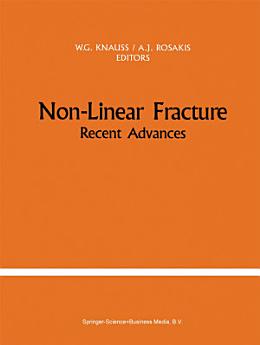Non-Linear Fracture: Recent Advances
W.G. Knauss · Ares J. Rosakis
mar 2013 · Springer Science & Business Media
Libro electrónico
404
Páginas
reportLas calificaciones y opiniones no están verificadas. Más información
Acerca de este libro electrónico
From time to time the International Journal of Fracture has presented special matters thought to be of interest to its readers. In previous issues, for example, Dr. H.W. Liu as Guest Editor assembled a series of review papers dealing with fatigue processes and characteristics in metals and non-metals (December 1980 and April 1981). Five years ago Guest Editor W.G. Knauss collected works dealing with dynamic fracture (March and April 1985). Continuing this policy, Dr. W.G. Knauss and Dr. A.J. Rosakis of the California Institute of Technology as Guest Editors have now organized an extensive set of papers concerning the influence of non-linear effects upon the mechanics of the fracture process. This collection is based upon contributions to a relatively small international Symposium on Non Linear Fracture Mechanics held under the auspices of the International Union of Theoretical and Applied Mechanics (IUTAM) and convened at the California Institute of Technology in March 1988. It should be noted that although the description of non-linear fracture inherently encompasses a strong material science component, this aspect is not heavily emphasized in the ensuing papers due to the intentional focus upon mechanics. Volume 42 of the International Journal of Fracture will therefore, in successive issues, deal respectively with topics in (1) Damage, (2) Interfaces and Creep, (3) Time Dependence, and (4) Continuum Plasticity. On behalf of the editors and publishers, I wish to express our appreciation to Dr. Knauss, Dr. Rosakis, and their colleagues for their collective efforts.
Califica este libro electrónico
Cuéntanos lo que piensas.
Información de lectura
Smartphones y tablets
Instala la app de Google Play Libros para Android y iPad/iPhone. Como se sincroniza de manera automática con tu cuenta, te permite leer en línea o sin conexión en cualquier lugar.
Laptops y computadoras
Para escuchar audiolibros adquiridos en Google Play, usa el navegador web de tu computadora.
Lectores electrónicos y otros dispositivos
Para leer en dispositivos de tinta electrónica, como los lectores de libros electrónicos Kobo, deberás descargar un archivo y transferirlo a tu dispositivo. Sigue las instrucciones detalladas que aparecen en el Centro de ayuda para transferir los archivos a lectores de libros electrónicos compatibles.





